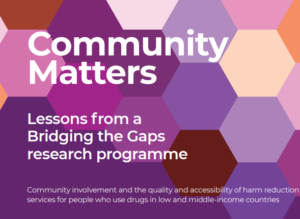A FEW Kyrgyzstan and AFEW International have contributed towards the new publication in Harm Reduction Journal, which is one of the outcomes of a multi-country research project about the impact of working with peers in harm reduction.
FEW Kyrgyzstan and AFEW International have contributed towards the new publication in Harm Reduction Journal, which is one of the outcomes of a multi-country research project about the impact of working with peers in harm reduction.
The multi-country study (Indonesia, Kyrgyzstan and South Africa) was aimed to understand how involvement of people who use drugs can influence the quality and availability of harm reduction services and was funded by Bridging the Gaps.
“Peer involvement of people who use drugs within HIV and harm reduction services is widely promoted yet under-utilised. Alongside political and financial barriers is a limited understanding of the roles, impacts, contexts and mechanisms for peer involvement, particularly in low- and middle-income settings.”
People who use drugs were involved in all aspects of the research, including design, data gathering, analysis, and writing of articles and reports. The three studies in Indonesia, South Africa, and Kyrgyzstan were complemented with a (global) literature review about the impact of community involvement on services.
The research team also included Rumah Cemara (Indonesia) and SANPUD/University of Pretoria (South Africa), and researchers from King’s College London, Mainline, and INPUD. Each country study was led by a team consisting of experts from the local community of people who use drugs and academic experts.
 Based on the research the group has four core messages:
Based on the research the group has four core messages:
1. More ambitious support is needed for expanded community involvement in harm reduction services
2. Community involvement can support increased access and quality of harm reduction services
3. Community leadership delivers research with impact
4. Research agendas need to expand and methodologies need to adapt.
You can read and download this open access publication here.



